Items
-
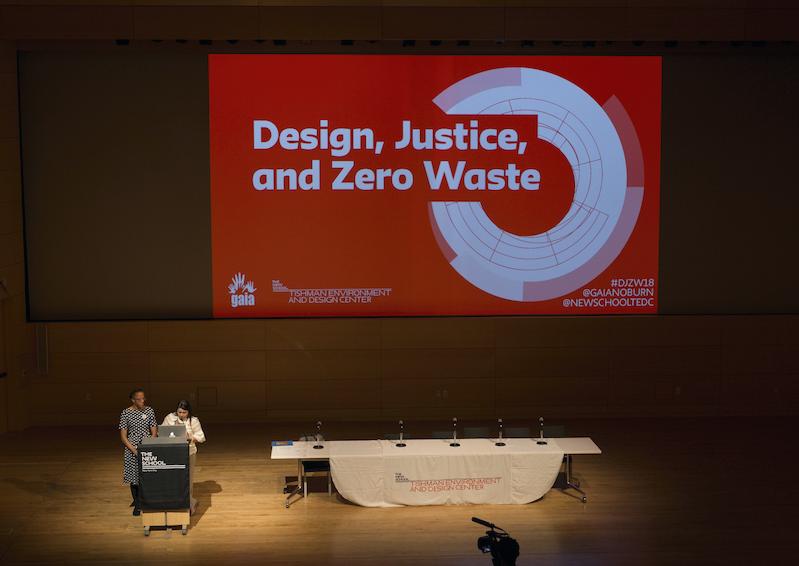 Event: Design, Justice & Zero Waste Conference 2018 Photos of 2018 Design, Justice & Zero Waste conference. Close ups of speakers, audience members listening, presentations.
Event: Design, Justice & Zero Waste Conference 2018 Photos of 2018 Design, Justice & Zero Waste conference. Close ups of speakers, audience members listening, presentations. -
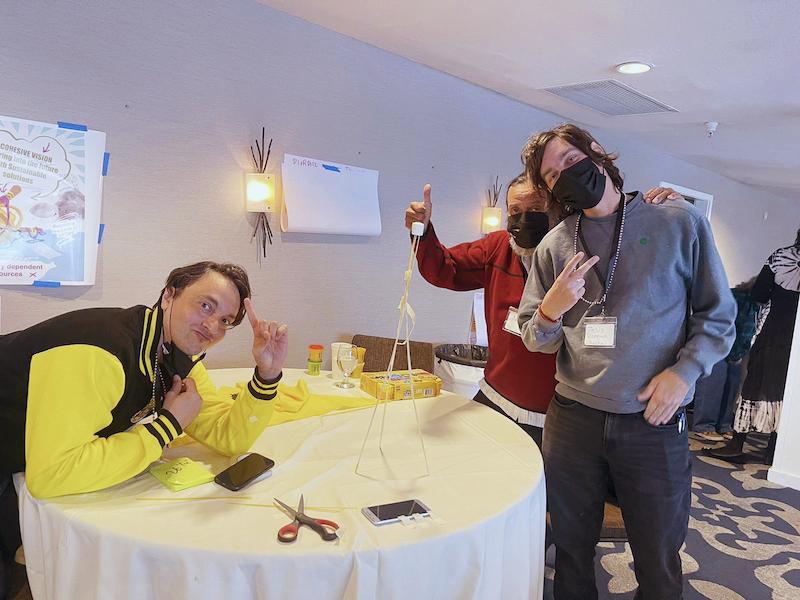 Media Collection: Day 1 of EJ Movement Fellowship Jan. 2023 Retreat Assorted photos and videos taken during the first day of the Environmental Justice Movement Fellowship's retreat, held Jan. 18-21, 2023, on the unceded territory of the Tongva peoples, also known as Long Beach, CA. The retreat was part of Phase 3: Manifest of this fellowship cohort.
Media Collection: Day 1 of EJ Movement Fellowship Jan. 2023 Retreat Assorted photos and videos taken during the first day of the Environmental Justice Movement Fellowship's retreat, held Jan. 18-21, 2023, on the unceded territory of the Tongva peoples, also known as Long Beach, CA. The retreat was part of Phase 3: Manifest of this fellowship cohort. -
 Event: Jean Gardner World Cafe 2017 Workshop led by Jean Gardner in 2017 with people sitting at tables in a conference room, writing on paper pads.
Event: Jean Gardner World Cafe 2017 Workshop led by Jean Gardner in 2017 with people sitting at tables in a conference room, writing on paper pads. -
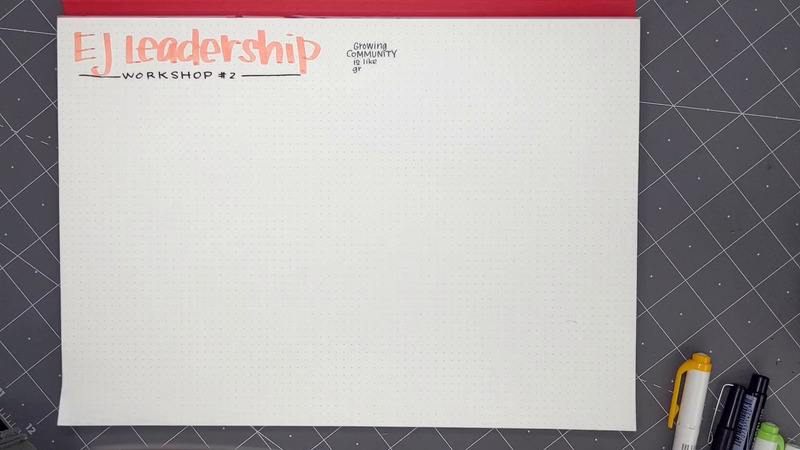 Video: Time Lapse of Graphical Notetaking at May 2021 EJ Movement Fellowship Workshop Time lapse video of Yuki Kidokoro doing graphical notetaking of the Environmental Justice Movement Fellowship workshop on May 14, 2021.
Video: Time Lapse of Graphical Notetaking at May 2021 EJ Movement Fellowship Workshop Time lapse video of Yuki Kidokoro doing graphical notetaking of the Environmental Justice Movement Fellowship workshop on May 14, 2021. -
 Video: Time Lapse of Graphical Notetaking at April 2021 EJ Movement Fellowship Workshop Time lapse video of Yuki Kidokoro doing graphical notetaking of the Environmental Justice Movement Fellowship workshop on April 29, 2021.
Video: Time Lapse of Graphical Notetaking at April 2021 EJ Movement Fellowship Workshop Time lapse video of Yuki Kidokoro doing graphical notetaking of the Environmental Justice Movement Fellowship workshop on April 29, 2021. -
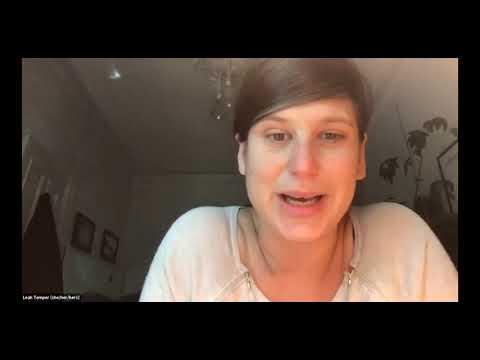 Video: Panel on Beyond Incrementalism: Disruption at Scale Talk in the series on Radical Reimaginations for Climate Justice, focused on moving beyond incrementalism, hosted by the Tishman Environment and Design Center, with guest speakers, Leah Temper, research associate at McGill University, and Jaron Browne, organizing director at Grassroots Global Justice Alliance.
Video: Panel on Beyond Incrementalism: Disruption at Scale Talk in the series on Radical Reimaginations for Climate Justice, focused on moving beyond incrementalism, hosted by the Tishman Environment and Design Center, with guest speakers, Leah Temper, research associate at McGill University, and Jaron Browne, organizing director at Grassroots Global Justice Alliance. -
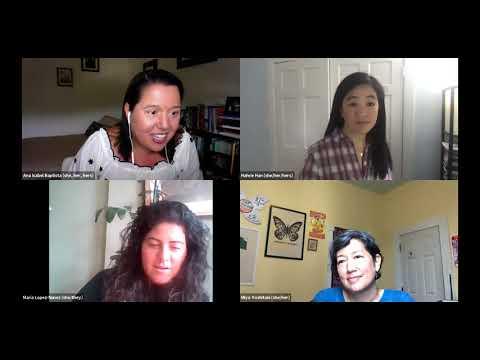 Video: Panel on Building Capacity for Disruption Talk in the series on Radical Reimaginations for Climate Justice, focused on building capacity for disruption, hosted by the Tishman Environment and Design Center, with guest speakers, Dr. Hahrie Han, professor and faculty director of the P3 Research Lab at Johns Hopkins University, Maria Lopez-Nuñez, deputy director of organizing and advocacy at Ironbound Community Corporation, and Miya Yoshitani, executive director of the Asian Pacific Environmental Network.
Video: Panel on Building Capacity for Disruption Talk in the series on Radical Reimaginations for Climate Justice, focused on building capacity for disruption, hosted by the Tishman Environment and Design Center, with guest speakers, Dr. Hahrie Han, professor and faculty director of the P3 Research Lab at Johns Hopkins University, Maria Lopez-Nuñez, deputy director of organizing and advocacy at Ironbound Community Corporation, and Miya Yoshitani, executive director of the Asian Pacific Environmental Network. -
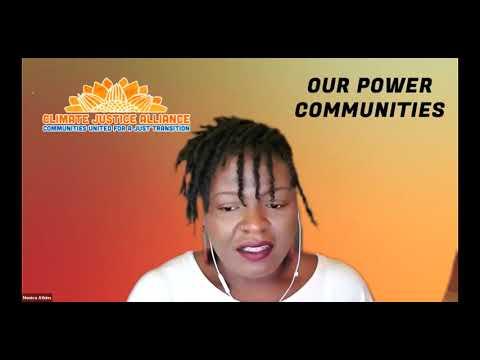 Video: Panel on Disruption and Contention: Learning from Black Lives Matter Talk in the series on Radical Reimaginations for Climate Justice, focused on disruption and contention and learning from Black Lives Matter, hosted by the Tishman Environment and Design Center, with guest speakers, Monica Atkins, director of organizing at the Climate Justice Alliance, and Deva Woodly, associate professor at The New School.
Video: Panel on Disruption and Contention: Learning from Black Lives Matter Talk in the series on Radical Reimaginations for Climate Justice, focused on disruption and contention and learning from Black Lives Matter, hosted by the Tishman Environment and Design Center, with guest speakers, Monica Atkins, director of organizing at the Climate Justice Alliance, and Deva Woodly, associate professor at The New School. -
 Video: Panel on Disrupting the Status Quo: Frameworks for Accelerated Change Talk in the series on Radical Reimaginations for Climate Justice, focused on disrupting the status quo, hosted by the Tishman Environment and Design Center, with guest speakers, Dwaign Tyndal, executive director of Alternatives for Community and Environment, and David Meyer, professor at University of California Irvine.
Video: Panel on Disrupting the Status Quo: Frameworks for Accelerated Change Talk in the series on Radical Reimaginations for Climate Justice, focused on disrupting the status quo, hosted by the Tishman Environment and Design Center, with guest speakers, Dwaign Tyndal, executive director of Alternatives for Community and Environment, and David Meyer, professor at University of California Irvine. -
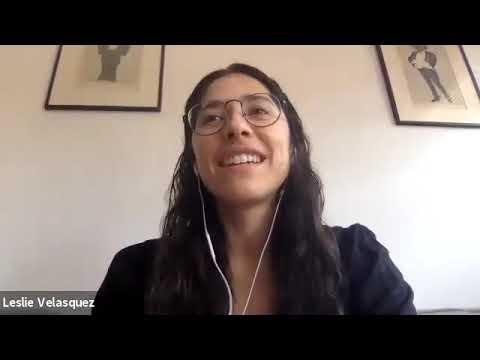 Video: Interview with Leslie Vasquez Interview with Leslie Vasquez, Enviromental Justice Programming Coordinator at El Puente.
Video: Interview with Leslie Vasquez Interview with Leslie Vasquez, Enviromental Justice Programming Coordinator at El Puente. -
 Video: Interview with Daniela Lam, 2020 Aronson Fellow 2020 Aronson Fellow Daniela Lam talking about her fellowship project in this edited video clip. Includes title card.
Video: Interview with Daniela Lam, 2020 Aronson Fellow 2020 Aronson Fellow Daniela Lam talking about her fellowship project in this edited video clip. Includes title card. -
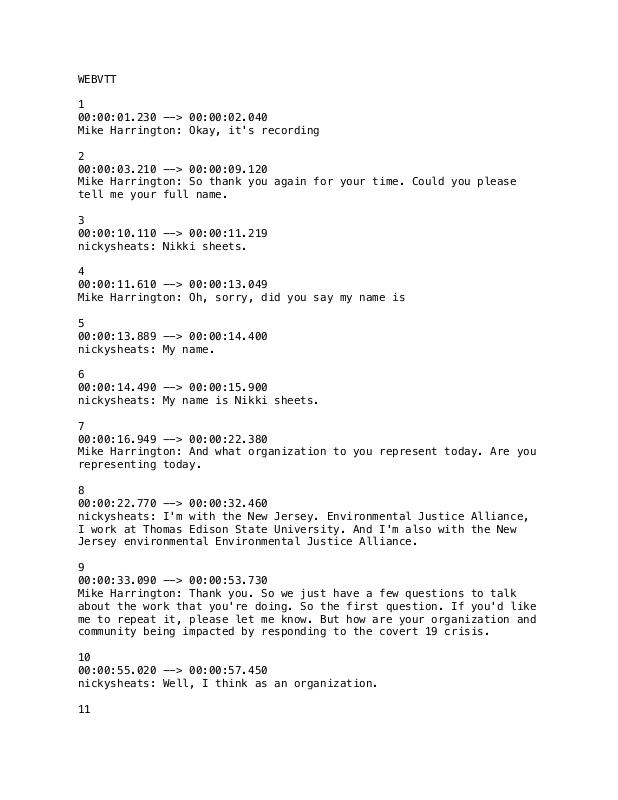 Transcript: Interview with Nicky Sheats Transcripts of full Interview with Nicky Sheats, New Jersey Environmental Justice Alliance
Transcript: Interview with Nicky Sheats Transcripts of full Interview with Nicky Sheats, New Jersey Environmental Justice Alliance -
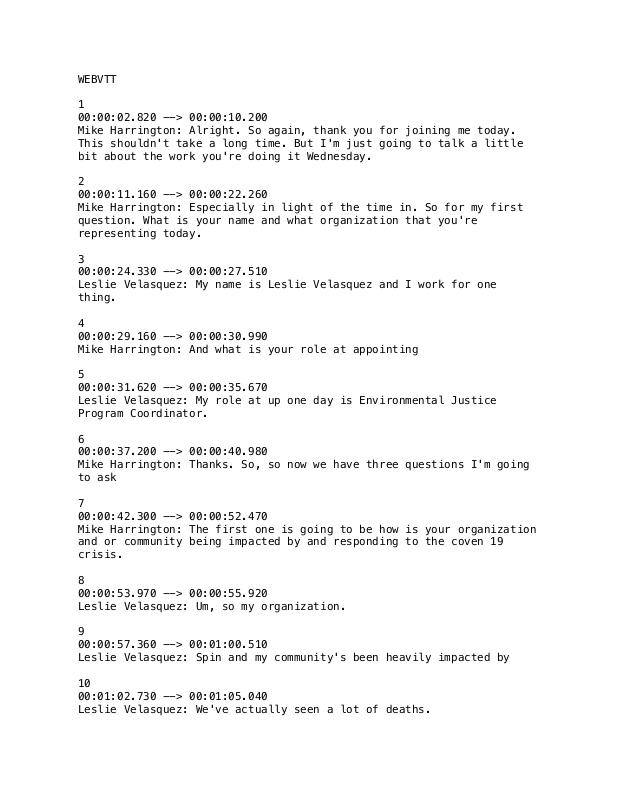 Transcript: Interview with Leslie Vasquez Transcript of Interview with Leslie Vasquez, Enviromental Justice Programming Coordinator at El Puente.
Transcript: Interview with Leslie Vasquez Transcript of Interview with Leslie Vasquez, Enviromental Justice Programming Coordinator at El Puente. -
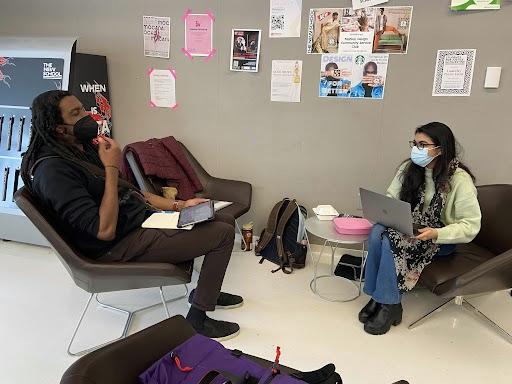 Photos: 2021-2022 Research Assistants TEDC staff and 2021-2022 research assistants in conversation and working together.
Photos: 2021-2022 Research Assistants TEDC staff and 2021-2022 research assistants in conversation and working together. -
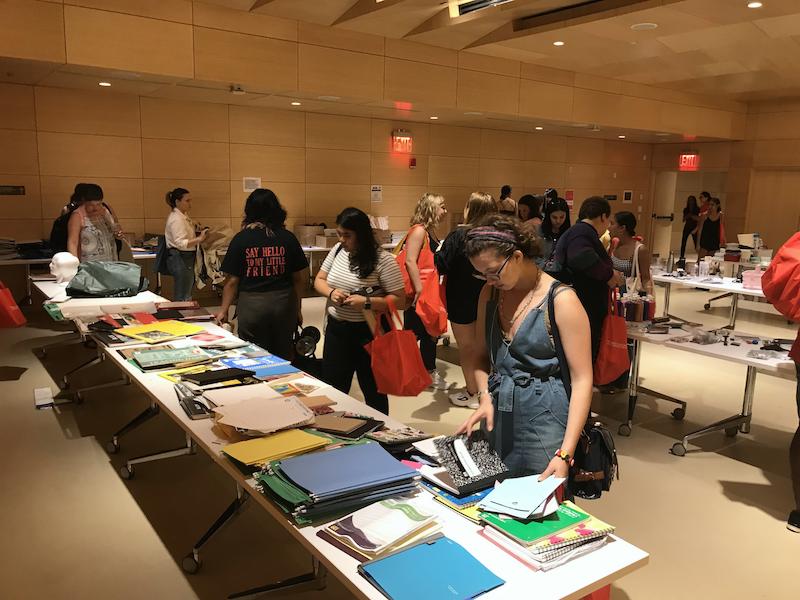 Event: Good As New Free Sale 2018 Good As New is a reuse and waste reduction initiative that encourages all New School students to donate reusable school supplies and materials at the end of each semester so that these items stay out of landfills, and can be used by other students in the future.
Event: Good As New Free Sale 2018 Good As New is a reuse and waste reduction initiative that encourages all New School students to donate reusable school supplies and materials at the end of each semester so that these items stay out of landfills, and can be used by other students in the future. -
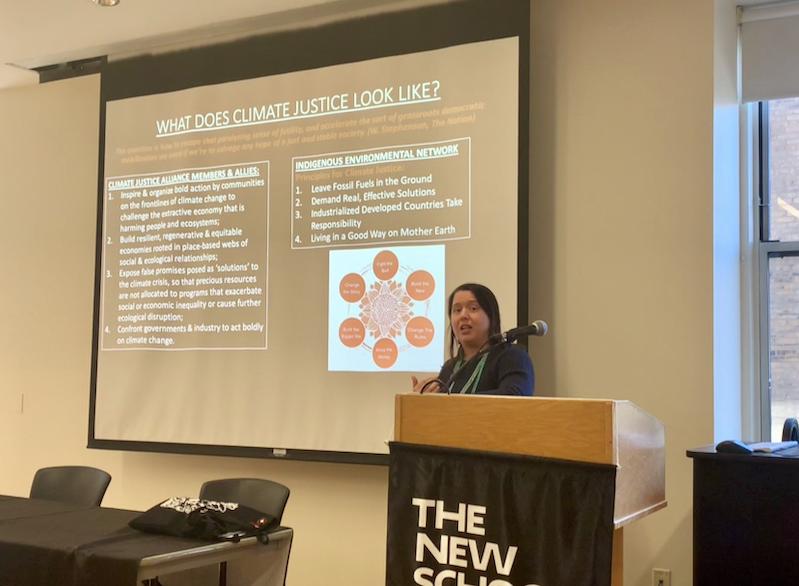 Event: Climate Teach-in Presentations at teach-in and shots of audience members
Event: Climate Teach-in Presentations at teach-in and shots of audience members -
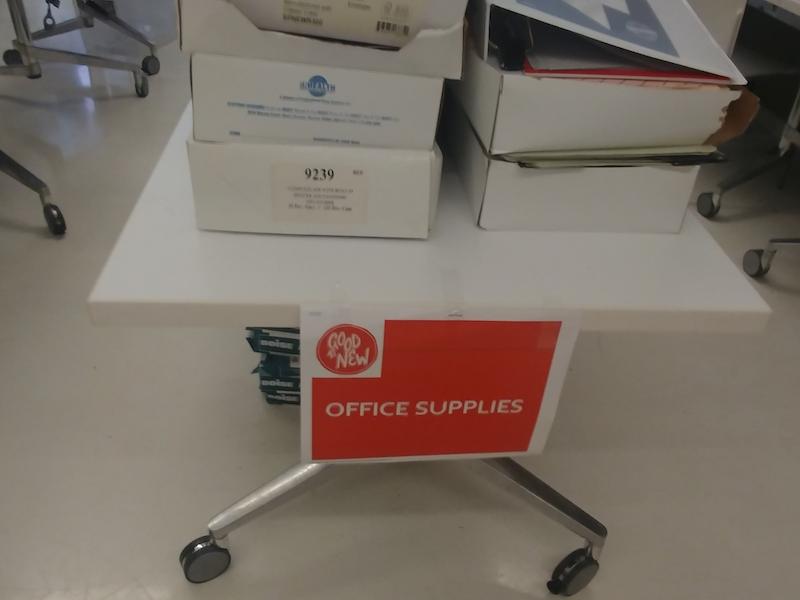 Event: Good As New Free Sale 2019 Good As New is a reuse and waste reduction initiative that encourages all New School students to donate reusable school supplies and materials at the end of each semester so that these items stay out of landfills, and can be used by other students in the future. Items and materials including wood, metal, plastic, paper, art supplies and tools are collected at drop-off points around campus. The materials will be stored and sorted over the summer, then distributed free of cost at the beginning of the following school year. Good as New is a collaborative effort with planning and implementation contributions from students, faculty, and staff representing the Tishman Environment and Design Center, the Parsons Making Center, Student Success, the Food and Housing Insecurity Working Group, Student Housing and Residential Education, and others.
Event: Good As New Free Sale 2019 Good As New is a reuse and waste reduction initiative that encourages all New School students to donate reusable school supplies and materials at the end of each semester so that these items stay out of landfills, and can be used by other students in the future. Items and materials including wood, metal, plastic, paper, art supplies and tools are collected at drop-off points around campus. The materials will be stored and sorted over the summer, then distributed free of cost at the beginning of the following school year. Good as New is a collaborative effort with planning and implementation contributions from students, faculty, and staff representing the Tishman Environment and Design Center, the Parsons Making Center, Student Success, the Food and Housing Insecurity Working Group, Student Housing and Residential Education, and others. -
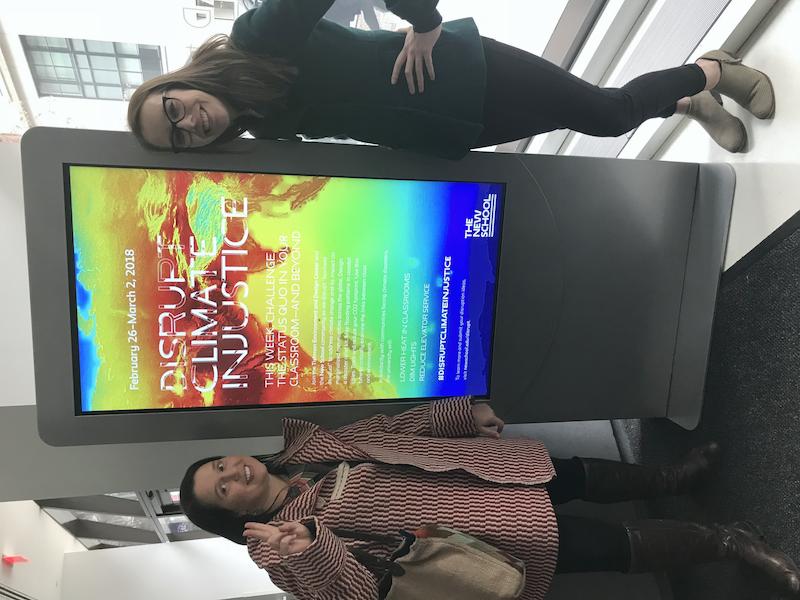 Event: Disrupt Climate Injustice Jainey Bavishi, Director of the NYC Office of Recovery and Resiliency, joined Michelle DePass, Director of the Tishman Environment and Design Center and Dean of the Milano School of International Affairs, Management, and Urban Policy, to discuss the importance of climate action, how to create just solutions for climate change problems, and the role of government and civil society in achieving climate justice.
Event: Disrupt Climate Injustice Jainey Bavishi, Director of the NYC Office of Recovery and Resiliency, joined Michelle DePass, Director of the Tishman Environment and Design Center and Dean of the Milano School of International Affairs, Management, and Urban Policy, to discuss the importance of climate action, how to create just solutions for climate change problems, and the role of government and civil society in achieving climate justice. -
 Photo: Group Photo with Elisabeth Dabney Group Photo with Elisabeth Dabney
Photo: Group Photo with Elisabeth Dabney Group Photo with Elisabeth Dabney -
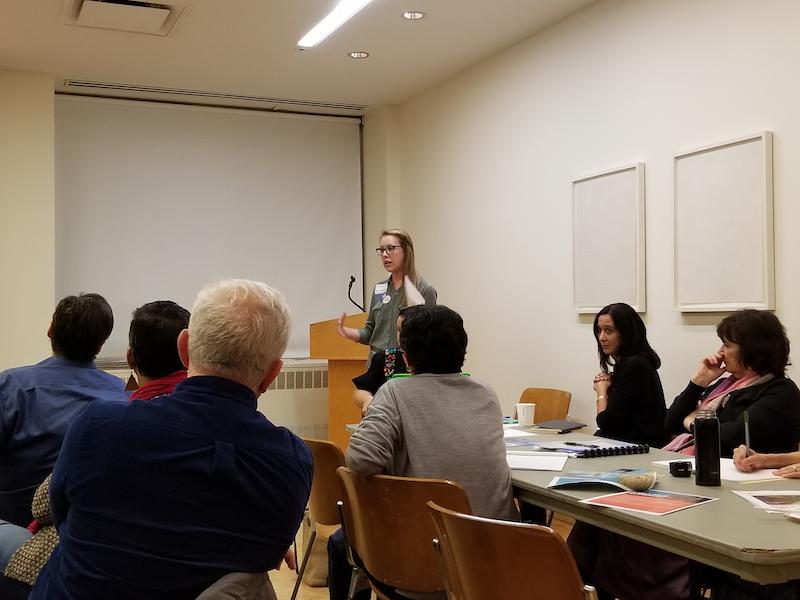 Event: November 2017 Affiliated Faculty Meeting 2017 Affiliated Faculty Meeting. Photos of group engaged in conversation with each other.
Event: November 2017 Affiliated Faculty Meeting 2017 Affiliated Faculty Meeting. Photos of group engaged in conversation with each other. -
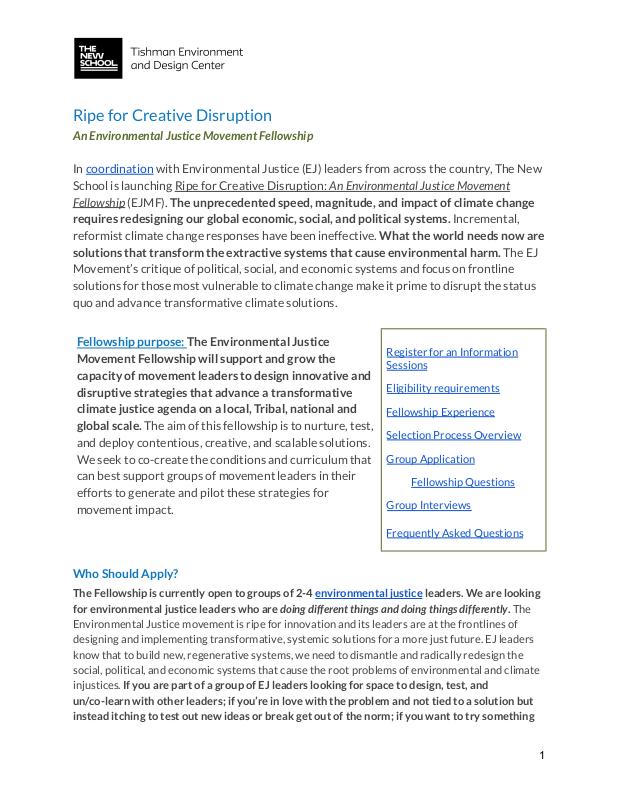 Document: Announcement and Description of Inaugural EJ Movement Fellowship: Ripe for Creative Disruption The 2021 announcement and request for applications for the inaugural cohort of the Tishman Environment and Design Center's fellowship, Ripe for Creative Disruption: An Environmental Justice Movement Fellowship (EJMF).
Document: Announcement and Description of Inaugural EJ Movement Fellowship: Ripe for Creative Disruption The 2021 announcement and request for applications for the inaugural cohort of the Tishman Environment and Design Center's fellowship, Ripe for Creative Disruption: An Environmental Justice Movement Fellowship (EJMF). -
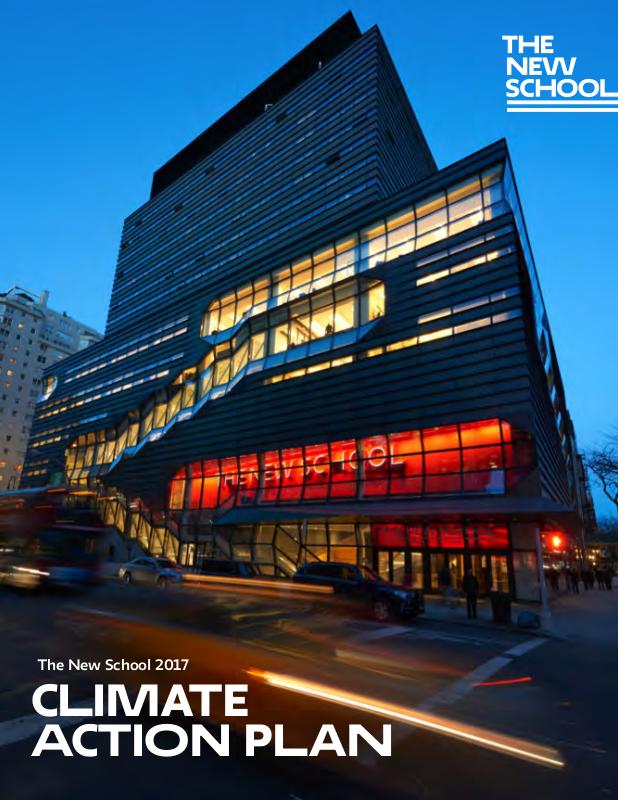 Report: 2017 Climate Action Plan 2017 Climate Action Plan which outlines the methods The New School will use to reduce the university’s greenhouse gas (GHG) emissions, and describes how these methods can become a model for solutions create a more resilient and more equitable future. Authors: Molly Craft Johnson, University Sustainability Associate, Tishman Environment and Design Center Erik Eibert, Assistant Director for Sustainable Initiatives, Buildings
Report: 2017 Climate Action Plan 2017 Climate Action Plan which outlines the methods The New School will use to reduce the university’s greenhouse gas (GHG) emissions, and describes how these methods can become a model for solutions create a more resilient and more equitable future. Authors: Molly Craft Johnson, University Sustainability Associate, Tishman Environment and Design Center Erik Eibert, Assistant Director for Sustainable Initiatives, Buildings -
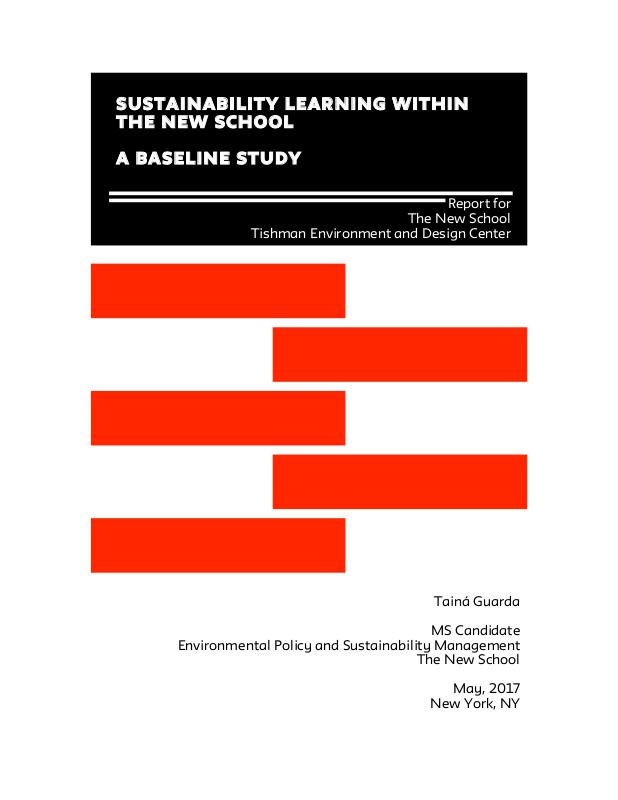 Report: Sustainability Learning Baseline Study Sustainability Learning within The New School A Baseline Study report. This report was created by Tainá Guarda for the Tishman Environment and Design Center at The New School as part of a capstone research project on sustainability learning at The New School. Tainá is a candidate for the Masters of Science in Environmental Policy and Sustainability Management at the Milano School of International Affairs, Management, and Urban Policy.
Report: Sustainability Learning Baseline Study Sustainability Learning within The New School A Baseline Study report. This report was created by Tainá Guarda for the Tishman Environment and Design Center at The New School as part of a capstone research project on sustainability learning at The New School. Tainá is a candidate for the Masters of Science in Environmental Policy and Sustainability Management at the Milano School of International Affairs, Management, and Urban Policy. -
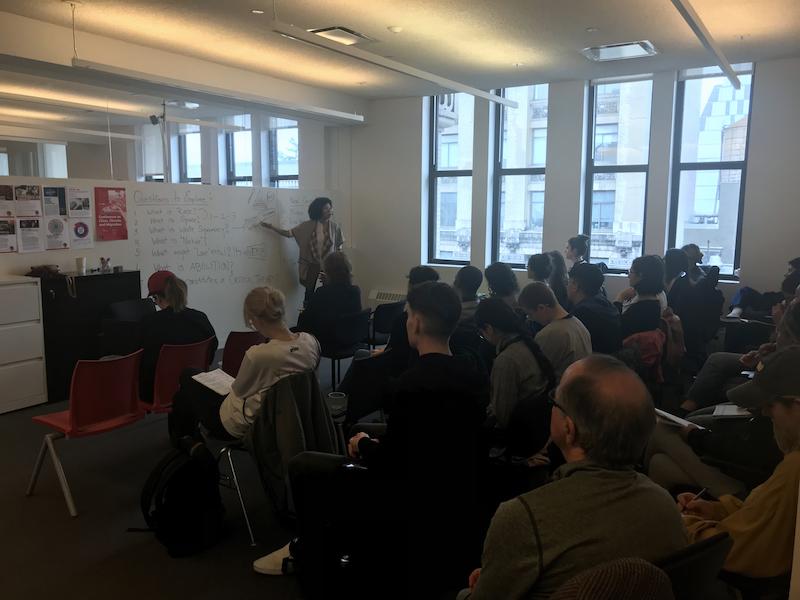 Event: Lunch & Learn with Mia White 2018 Lunch and Learn Series with Visiting Scholar Mia White. Group of people in discussion, posing for photos. Mia White is currently an faculty-affiliate of the Tishman Environment and Design Center.
Event: Lunch & Learn with Mia White 2018 Lunch and Learn Series with Visiting Scholar Mia White. Group of people in discussion, posing for photos. Mia White is currently an faculty-affiliate of the Tishman Environment and Design Center. -
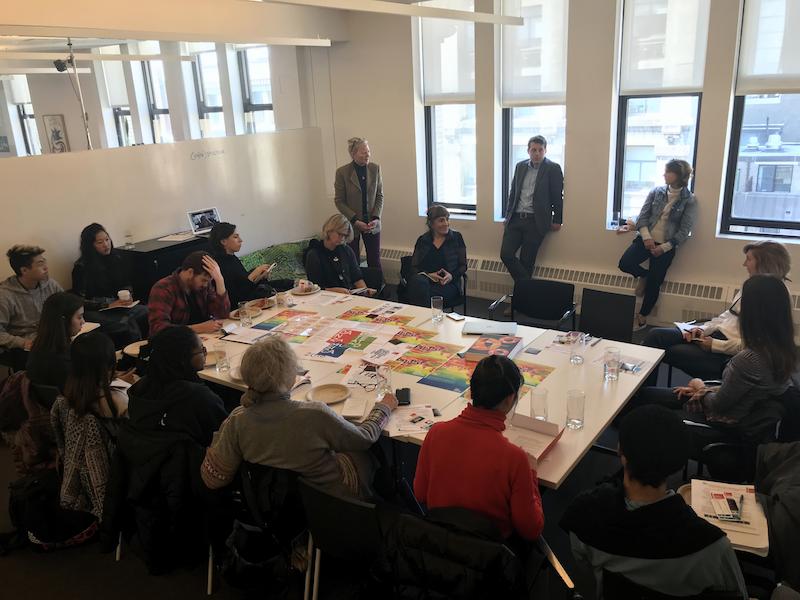 Event: Lunch & Learn with Barbara Pace 2019 Lunch and Learn Series with Visiting Scholar Barbara Pace. Group of people in discussion, posing for photos.
Event: Lunch & Learn with Barbara Pace 2019 Lunch and Learn Series with Visiting Scholar Barbara Pace. Group of people in discussion, posing for photos.